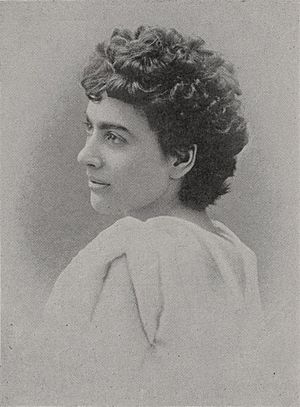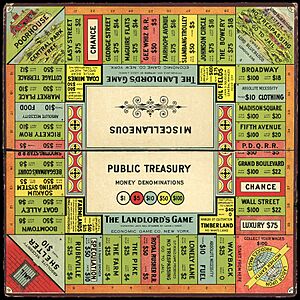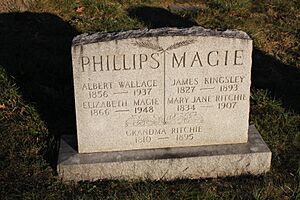Lizzie Magie facts for kids
Quick facts for kids
Elizabeth Magie
|
|
|---|---|

Magie in 1892
|
|
| Born |
Elizabeth J. Magie
May 9, 1866 Macomb, Illinois, U.S.
|
| Died | March 2, 1948 (aged 81) Arlington, Virginia, U.S.
|
| Resting place | Columbia Gardens Cemetery Arlington, Virginia, U.S. |
| Other names | Elizabeth J. Magie Phillips |
| Occupation |
|
| Spouse(s) |
Albert Phillips
(m. 1910; died 1937) |
Elizabeth J. Magie Phillips was an American game designer, writer, and activist. She created "The Landlord's Game". This game was the original version of what we now know as "Monopoly". She designed it to teach about economic ideas from her time.
Contents
Elizabeth Magie's Early Life and Work
Elizabeth Magie was born in Macomb, Illinois, in 1866. Her father, James K. Magie, published a newspaper. He was also an abolitionist, meaning he worked to end slavery. He even traveled with Abraham Lincoln to discuss politics.
In the 1880s, Elizabeth moved to the Washington D.C. area. She worked as a stenographer and typist. She was also a talented writer, actress, and even an engineer. She believed strongly in equal rights for women.
When she was 26, Elizabeth received a patent for an invention. It made typewriters easier to use. Back then, very few women received patents. She also worked as a news reporter. In 1910, she married Albert Wallace Phillips. They did not have children.
Elizabeth Magie: An Activist for Change
Elizabeth was a strong activist. She supported the women's rights movement and an economic idea called Georgism. This idea came from her father's beliefs. Georgism suggested that instead of taxing people's earnings, the government should tax land. The amount of tax would depend on how useful or big the land was. The money collected would fund the government. Any extra money would then be shared with everyone.
Supporters believed this would help people use land wisely. It would also share wealth more fairly. This idea was very important to Elizabeth. It inspired her to create "The Landlord's Game."
Elizabeth believed women were just as smart and capable as men. This was a very new and bold idea in the 1800s. She knew that women often earned very little money. It was hard for them to live independently.
To highlight the challenges women faced, Elizabeth did something very unusual. She placed an advertisement in a newspaper. She wanted to show how women often lacked freedom and independence. This bold action made people talk. It spread her message about women's rights across the country. Elizabeth became known as a brave supporter of women's equality.
Inventing The Landlord's Game
Elizabeth first shared "The Landlord's Game" with friends. This was when she lived in Brentwood, Maryland. In 1903, she applied for a patent for her board game. She received U.S. Patent 748,626 on January 5, 1904. This was many years before women could vote across the entire United States.
"The Landlord's Game" showed the problems with owning too much land. It also taught about the idea of a land value tax. At first, the game's goal was just to get rich. Later, Elizabeth added two ways to play. One way, called "Monopoly," focused on owning everything. Players tried to force others out of business. The other way, called "Prosperity," encouraged players to create things and work together. This game later inspired the famous "Monopoly" board game.
In 1906, she moved to Chicago. There, she and others who shared her economic ideas started a company. They published her first version of "The Landlord's Game." Later, in 1910, Parker Brothers published another game she created, called Mock Trial. A company in Scotland also tried to patent her game.
Elizabeth and her husband moved back to the east coast of the U.S. In 1924, she patented an updated version of her game. Her first patent had expired in 1921. Many college students were already playing her game. They even made their own copies. In 1932, a second edition of "The Landlord's Game" was released. It included both the "Monopoly" and "Prosperity" ways to play.
Elizabeth also created other games. These included Bargain Day and King's Men in 1937. A third version of "The Landlord's Game" came out in 1939. Bargain Day was about shopping. King's Men was a strategy game.
Elizabeth Magie's Later Years
Elizabeth Magie passed away in 1948 at age 81. She was buried next to her husband, Albert Wallace Phillips. He had died in 1937. They did not have children. When she died, many people did not know how much she had influenced board games.
The Story Behind Monopoly
Elizabeth's game became very popular. Many people, including college students, enjoyed playing it. About 30 years after she invented "The Landlord's Game," Parker Brothers released a new version. They called it "Monopoly." A man named Charles Darrow said he invented "Monopoly" himself. Elizabeth later spoke up. She said she only earned $500 from her invention. She received no credit for "Monopoly."
In 1936, Elizabeth gave an interview to a Washington, D.C. newspaper. She pointed out how similar "Monopoly" was to her game. The article explained that she spent more money creating her game than she earned. She also did not get credit for "Monopoly." After these interviews, Parker Brothers agreed to publish two more of her games. However, they still gave Charles Darrow credit for inventing "Monopoly."
Charles Darrow was known as the inventor of "Monopoly" for a long time. Then, a game creator named Ralph Anspach found Elizabeth's original patents. He was researching "Monopoly's" history for his own game. He discovered that Darrow had taken credit for an idea he learned from others. Since then, Elizabeth's role in creating "The Landlord's Game" has received more attention. Even though others got credit and made money from her idea, she is now recognized. She is finally getting credit for inspiring one of the world's most popular board games.
Elizabeth Magie's Lasting Impact
Only after Elizabeth's death did people truly appreciate her impact. She helped make circular board games popular. Most games back then were straight paths. Her game encouraged players to interact and compete. It was a new idea. Her board game inspired "Monopoly," a very famous game. It also taught important lessons. These included sharing wealth and avoiding monopolies. These teaching parts were not in the "Monopoly" version by Charles Darrow.
Elizabeth also helped the women's movement. She spoke out for equality for all people. She invented games when very few women received US patents. She also wrote articles in newspapers. She used her voice to fight against unfair treatment.
See also
 In Spanish: Elizabeth Magie para niños
In Spanish: Elizabeth Magie para niños
 | Mary Eliza Mahoney |
 | Susie King Taylor |
 | Ida Gray |
 | Eliza Ann Grier |



